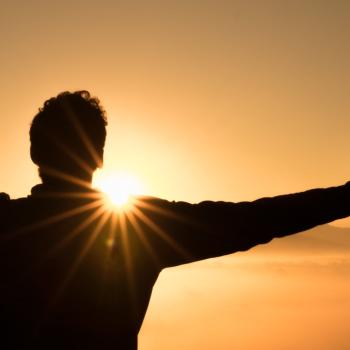A number of times you bring up Thomas Jefferson's abridgement of the Gospels. He seems to be someone who, in some ways, you're identifying with but also making very different choices from.
I don't have the luxury of just snipping out the parts of the Bible I don't like. Whereas I greatly admire Jefferson and the Enlightenment figures for their courage in blasting through so much that was oppressive and corrosive and damaging, there are times when their blind spots are so evident. I don't want to be flippantly rejecting of the Enlightenment, but I am post-Enlightenment in that I am a postmodernist. Postmodernism gets a bad rap, but what it tells us is that all we see depends on where we're standing, which is only one place among many. That is the liberation and the grief of postmodernism -- you have to always know that you're not seeing something of possibly enormous importance. To ignore that challenge is to ignore the challenge of our age.
Another outgrowth of the Enlightenment, too, is the historical-critical scholarship on the Gospels. How much was that a part of your process?
Not much. I revere that kind of scholarship, and I looked at it just to make sure I wasn't being a jerk, but it wasn't feeding the appetite I was interested in. It wasn't explaining the ridiculous powers that this character of Jesus has. Why is he such a hit? People went to fundamentalism and to very anti-intellectual forms of spirituality because that kind of scholarship wasn't feeding their hunger. There has to be some way, I hoped, of using reason and our analytical skills while also dealing with resonance, mystery, paradox, and conundrum. Literature, it seems to me, is one way. Words like "beauty," "love," and "consolation" don't really have a place in a scholarly diction, and those are terms that might feed a hunger which is now only being fed by fear and rage.
Did you end up, as a writer yourself, identifying with the authors of the Gospels?
I particularly identify with Luke. Although he has moments of being very harsh, it's also the most female text. That Christianity makes a place for maternity and childhood, we owe to Luke. The figure of the Virgin Mary and the early life of Jesus come mostly through him. Luke also has tenderness and lyricism, including some real poems. I felt a great attachment to that.
Do you think that a text with such unique authority and power through history could be written now? Or does it seem like a kind of creation of which we're no longer capable?
The Gospels weren't really written in the way that we think of writing. Luke wasn't a guy who sat down and said, "I think I'll write a Gospel." They really were functions of a community, designed for its specific needs. The whole notion of the individual author, writing for an anonymous audience -- which is how one writes today -- is not what writing was. I can't imagine a writer having that relationship to a community anymore.
The form of this book covers a number of different genres, including commentary, exegesis, polemic, and memoir. Was there a model in mind?
No, I didn't have any model. The books about Jesus that I went to were either very, very personal and not analytic at all, or very analytic and not personal at all. I was trying to mesh those two voices. I let the stories steer me. Originally, I intended to do some kind of Talmudic interpretation of the whole of the Gospels, but that would take thousands of pages. So I began with asking, "What are the stories that mean the most to me?" And then, "What are the ones that trouble me most?" I really wanted to end it with the coda of the Seven Last Words and the Resurrection, which are beyond reason and, in a way, even beyond language. That was my formal impulse.
Part of the power of the Gospel narratives is that they resist selective reading, though, right? They draw us out of complacency and demand that we read everything and follow everything.
Exactly. On the other hand, giving everything makes you crazy. I guess that's why the story of the washing of Jesus' feet is so important to me. He says, "I want that perfume. I want it right now, and if it means the poor aren't going to get to eat, they're just going to have to wait." That complication of the ascetic is very dear to me. There are moments when luxury is what is needed, when beauty is what is needed. That is why I find Jesus is so compelling -- it's never just one thing. He demands of us a very full humanity.
I read your chapter on asceticism a couple of times over. You struggle with how the Gospels talk about happiness. Why does Jesus seem like he doesn't want us to be happy? Why is he not concerned with happiness?
It's a conflict for me. I'm drawn to the ascetic ideal and to an ideal of perfection. But I don't think it works very well in the world. Finally, the central question of everything has to be its relationship to human suffering. Does the ascetic contribute to the alleviation of suffering, or does it contribute to more suffering? When I look at people in my own life who have alleviated my suffering or who have caused my suffering, it tends to be the Prodigal Son-types who have alleviated it.




